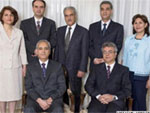End to Suppressive Measures against Bahais
» Human Rights Activists Demand

The remarks by Hassan Haddad, the security deputy of Tehran Public Prosecutor’s Office regarding the submission of the case involving seven Bahais charged with espionage for Israel to Tehran’s Revolutionary Court and the growing arrests of Bahais in Iran have resulted in wide protests from the Bahai community in Iran and human rights groups in and outside Iran.
Hassan Haddad, who is the deputy for notorious Judge Saeed Mortezavi last Wednesday announced that the dossier of the Bahais had been reviewed in the first branch of the Prosecutors’ Office and with the finalization of the charges would be sent to the Revolutionary Court. According ISNA student news agency, Haddad said the charges against the Bahais were, “Insulting Islamic canons and propaganda against Islam.” Haddad refrained from naming the individuals facing the charges but the media did name them to be Behrouz Tavakoli, Saeed Rezai, Fariba Kamalabadi, Vahid Tizfahm Jamaledin Khanjani, Anif Naim and Mahvash Sabet who are among the leaders of the Bahai sect in Iran who were arrested last April by security forces. Some reports have also indicated that the accused may be given death as the capital punishment.
Dian Alai, a representative from the World Bahai Association at the UN disregarded the “security and espionage charges” against them in a conversation with German radio station. According to the spokesperson, the work of these individuals was limited to those concerning “the management of the Bahai community in Iran and attending to such matters as recording marriages, education of children and consultations about the daily lives of the community members.”
According to Ms Alai, the efforts of the defense attorney in the case Shirin Ebadi over the case or to meet with the defendants have failed.
In this regard a group of academicians, writers, artists, journalists and Iranian activists around the world issued an open letter titled “We are Ashamed” in this regard in protest to the treatment of the Bahai community in Iran and called for the end of “century and half of oppression and silence” of the Bahais of Iran.
The letter reads, “We believe that every Iranian, regardless of race, color, gender, language, religion, political belief, or any belief, ethnicity, social background, wealth, or any other situation must enjoy all the rights provided in the Universal Declaration of Human Rights, while the Bahais of Iran have been deprived of these human rights from the first day of the appearance of Bahaism till today.”
The signatories of the letter point out that “according to historic documents .. thousands of Bahais have been murdered simply because of their religious beliefs.” The letter lists some of the discrimination practices against the Bahais since the establishment of the Islamic Republic of Iran in 1979, and writes, “We are shameful for remaining silent regarding these painful realities of our co-nationals where they are under systematic pressure and humiliation and where many remain behind are merely because of their religious belief and whose homes or work of place are under attack and destruction, and in some cases even their graves are decimated.
